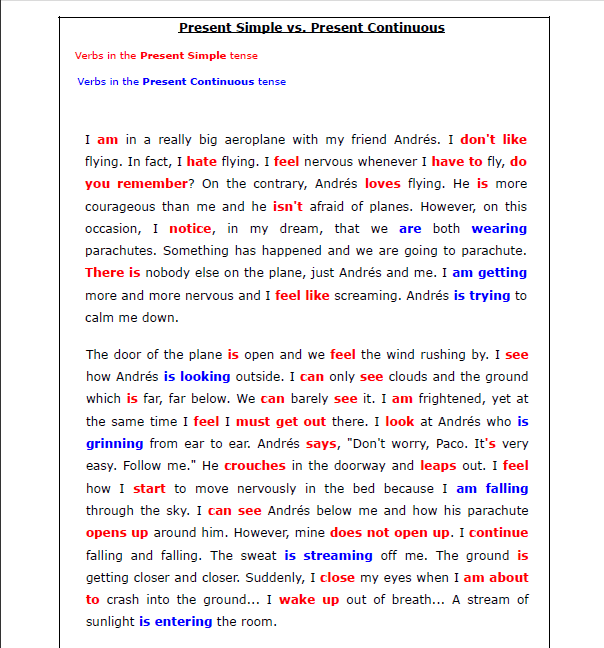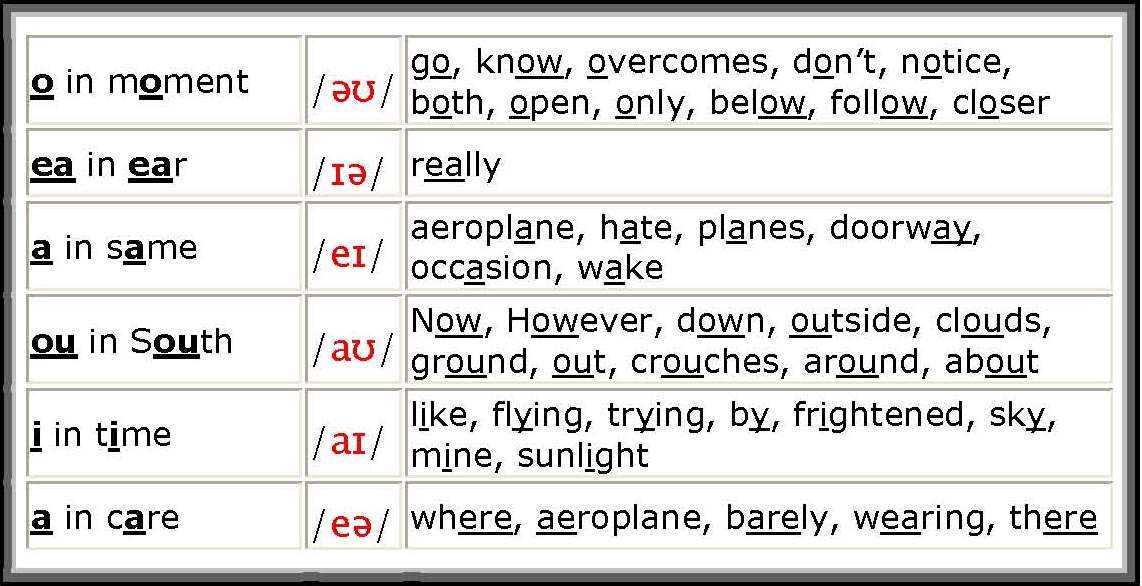6. Solved exercises

By c3896. C. Commons
I am in a really big aeroplane with my friend Andrés. I don't like flying. In fact, I hate flying. I feel nervous whenever I have to fly, do you remember? On the contrary, Andrés loves flying. He is more courageous than me and he isn't afraid of planes. However, on this occasion, I notice, in my dream, that we are both wearing parachutes. Something has happened and we are going to parachute. There is nobody else on the plane, just Andrés and me. I am getting more and more nervous and I feel like screaming. Andrés is trying to calm me down.
The door of the plane is open and we feel the wind rushing by. I see how Andrés is looking outside. I can only see clouds and the ground which is far, far below. We can barely see it. I am frightened, yet at the same time I feel I must get out there. I look at Andrés who is grinning from ear to ear. Andrés says, "Don't worry, Paco. It's very easy. Follow me." He crouches in the doorway and leaps out. I feel how I start to move nervously in the bed because I am falling through the sky. I can see Andrés below me and how his parachute opens up around him. However, mine does not open up. I continue falling and falling. The sweat is streaming off me. The ground is getting closer and closer. Suddenly, I close my eyes when I am about to crash into the ground... I wake up out of breath... A stream of sunlight is entering the room.
 |
| By Leo Reynolds. C. Commons |
When using the Present Simple tense, we must take into account that most verbs add -(e)s to the third person singular (he, she, it). It is a common mistake not to add it. We encourage you not to forget the third person singular -s!
It is also very important that you remember that in English the order of the words in the sentence is more fixed than in other languages. This makes English far easier than those languages in which the position of the words is less fixed. Remember:
| Subject | Verb | (Indirect Object) | (Direct Object) | (How) | (Where) | (When) |
| Paco |
goes | to bed | ||||
| We |
are wearing | parachutes |
Draw a chart similar to the one above and fill in the correspondent boxes with the following sentences from the passage.
I am in a really big aeroplane / I am getting more and more nervous / I start to move nervously in the bed / I close my eyes / A stream of sunlight is entering the room
 |
| By Kevin Steele. C. Commons |
 |
| By Torley. C. Commons |
Answer: Do I feel nervous whenever I have to fly?
Let's improve these changes. This will be very helpful and useful for your English.
| Sentence |
Negative | Interrogative |
| Andrés is more courageous than me |
||
| I notice we are both wearing parachutes |
||
| I can see Andrés below me |
||
| A stream of sunlight is entering the room |
||
| He crouches in the doorway and leaps out |
How about the interrogative negative forms?
| Short negative interrogative | Long negative interrogative |
| ... |
... |
As you can see, the long form of the negative interrogative sentences in English is far more difficult than the short forms. So, when using negative interrogatives, try to use short forms!

|
Another question in the PAU is, up to now, related to pronunciation. In it, you are asked to find out in the text two words which contain the same sound as a word which is provided. Normally, the sounds asked are long vowels, short vowels, diphthongs, and, more oddly, triphthongs.
Let's see and example and later we will briefly see how it works.
Find as many words as you can in the text containing vowels that are pronounced in the same way as
| o in moment |
... ... ... ... ... |
| ea in ear |
... ... ... ... ... |
| a in same |
... ... ... ... ... |
| ou in South |
... ... ... ... ... |
| i in time |
... ... ... ... ... |
| a in care |
... ... ... ... ... |
(Underline the part of the word that contain the sound).
Don't you worry if you find it difficult now. When you get used to this exercise you'll find it easy and simple.

